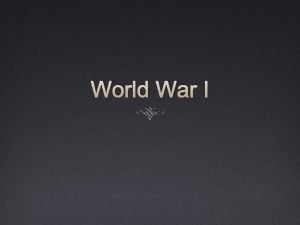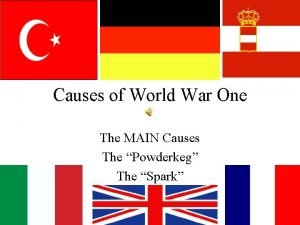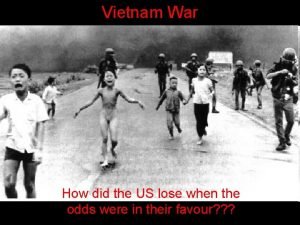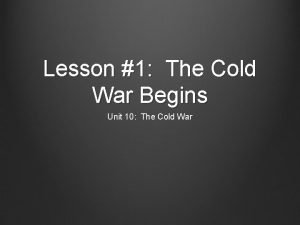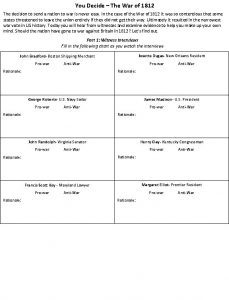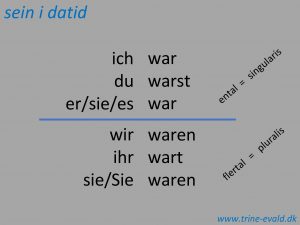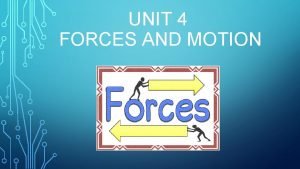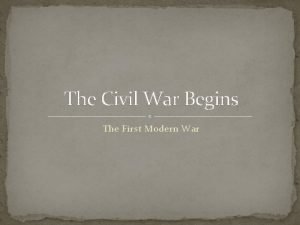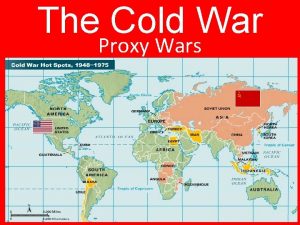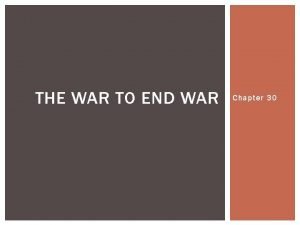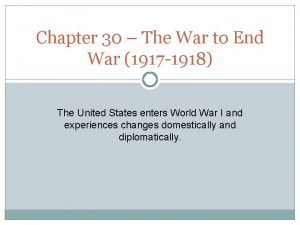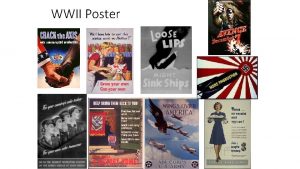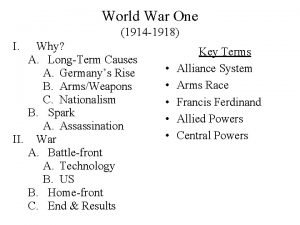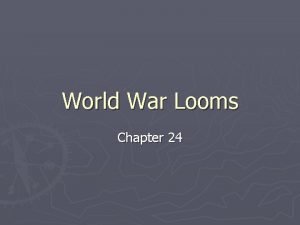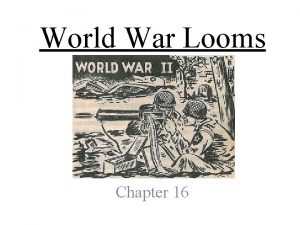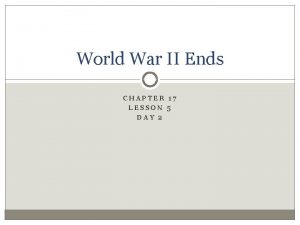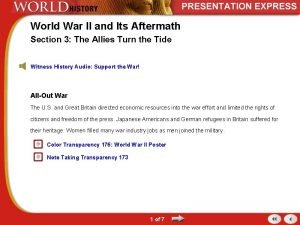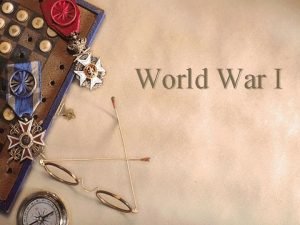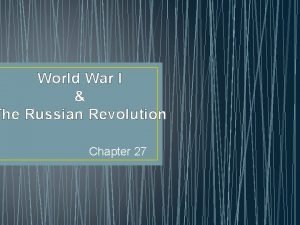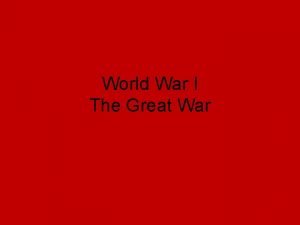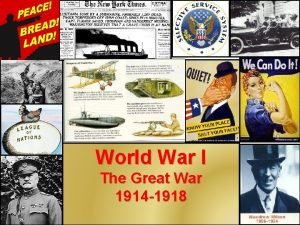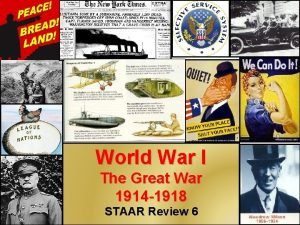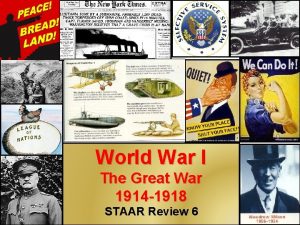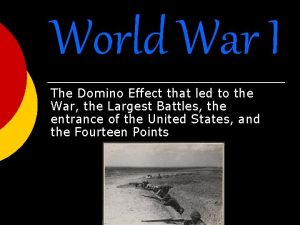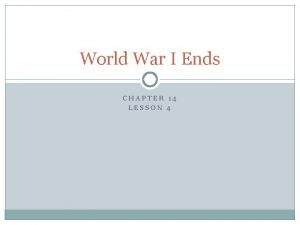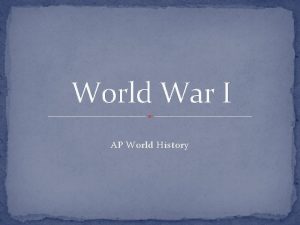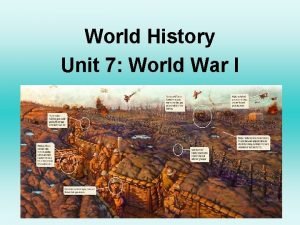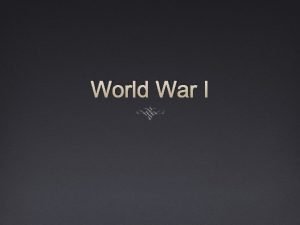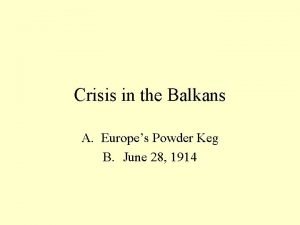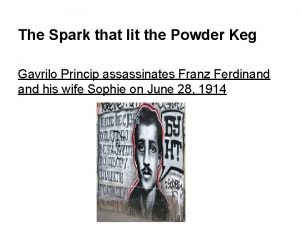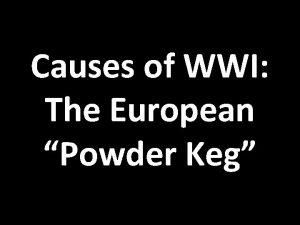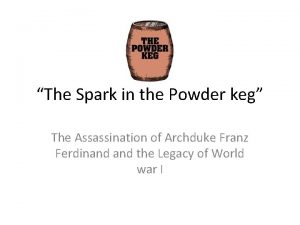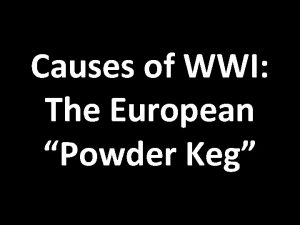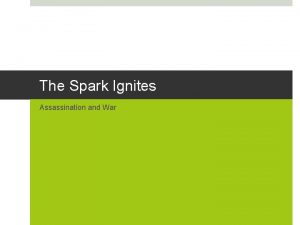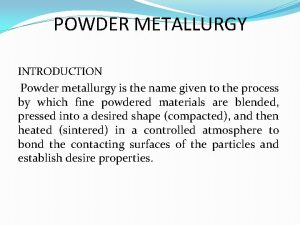World War I The Powder Keg Ignites World
















































































- Slides: 80

World War I

The Powder Keg Ignites World War I began in Eastern Europe Crisis began with the assassination of Archduke Francis Ferdinand of Austria-Hungary Was visiting Bosnia but also home to many Serbs and Slavics Serbians were unhappy with the visit Viewed Austrians as foreign oppressors Serbian terrorist group known as the Black Hand carried out the assassination

Video of Assassination https: //www. youtube. com/watch? v=lbfh. H 6 a. K 8 v. I

Assassination of Archduke ignored warnings of anti-Austrian unrest in Sarajevo June 28, 1914 - he and his wife were shot They were in an open car in Sarajevo

Immediate Causes to World War I Serbia wanted to create a South Slav State (Pan-slavism) and wanted to annex Bosnia which belonged to Austria June 28, 1914: Archduke Franz Ferdinand, Austrian heir to throne, assassinated by Serbian nationalist Princip (member Serbian "Black Hand") while visiting Bosnia. Herzegovina. Austria Issues Serbia an ultimatum: Punish those involved and end all anti. Austrian aggression or else.

Austria Strikes Back Government of Vienna saw assassination as an excuse to crush Serbia Germany was upset by the assassination Germany gave Austria the “blank check”- a promise of unconditional support no matter what the cost. Austria sent Serbia and ultimatum Tried to avoid the war Serbia was supposed to end all anti-Austrian agitation in punish the Serbians who were involved in the plot

The Ultimatum Serbia agreed to most but not all the terms of the ultimatum July 28, 1914 - Austria declared war on Serbia

The Alliances Kick In Carefully planned alliances kicked in when conflict arose. After Austria declared war, Serbia went running to its ally Russia Nicholas II asked William II to ask Austria to soften the demands, this failed Russia then began to mobilize- prepared troops for war August I- Germany responded by declaring war on Russia

The Alliances Kick In Russia went to its ally France gave same kind of backing Germany did to Austria Germany demanded France stay out of the conflict Germany declared war on France

Immediate Causes Aug 1, German declares war on Britain and France Aug. 3, Germany invades Belgium; France declares war on Germany Aug 4, Britain declares war on Germany

European Theatre Two opposing alliances Central Powers (Triple Alliance): Germany, Austria-Hungary, Ottoman Empire (also Bulgaria) Allies (Triple Entente): Britain, France, Russia (later, Japan, Italy and U. S. )

II. How It Began

A. The Balkans (“Powder Keg of Europe”)


WAR

Germany Invades Belgium Italy and Britain remained uncommitted Italy chose to remain neutral Neutrality- policy of supporting neither side in a war Schlieffan Plan Germany’s location presented itself as a two-front war (France in the west and Russia in the east) Schlieffan Plan was designed to avoid this issue Plan- attack France first because Russia was slow to industrialize

Schlieffan Plan Goal: to surprise attack France by going through Belgian borders European countries signed a treaty to keep Belgium neutral Idea was to encircle and crush France’s army Germany invaded Belgium on August 3 rd When Germany went through Belgium, Britain declared war on Germany on August 4 th

Section 2: A New Kind of War

Information about the Great War was the largest conflict in history up to that time France mobilized 8. 5 million men, Britain nearly 9 million, Russia 12 million, and Germany 11 million

Section 2: A New Kind of Conflict Early Battles – Western Front Battle of the Marne (Sept. 1914): After Germans came within sight of Paris, French and British forces pushed German forces back. Led by General Joseph Joffre

Stalemate on the Western Front German forces fought their way through Belgium toward Paris Belgium tried to resist but German power was much too powerful

The Schlieffan Plan Failed Russia mobilized faster Russia won small victories over Germany had to then fight a two front war (France and Russia) Battle of the Marne- ended Germany’s hope of a quick victory on the Western Front


The Stalemate Both sides dug deeper trenches to protect their armies Stalemate- a deadlock in which neither side is able to defeat the other Battle lines in France remained unchanged for 4 years

New Technology Machine guns Artillery gun Poison Gas Trench Warfare Tanks Airplanes Submarines

B. Trench Warfare

1. 2. 3. Goals Conditions Success



German “U” Boats Damaged the Allied side Sank many ships going to Britain


Early Battles – Western Front 1916: Battle of Verdun Germans wanted to “Bleed France White” and force it to sue for peace Franc lost 540, 000 men and Germany lost 430, 000 and Battle of the Somme; horrific casualties; neither side could break through British and French offensive to break through German lines Losses men: Britain 420, 000; France 200, 000; Germany 650, 000

The Eastern Front Battle of Tannenburg (August of 1914) Central Powers crush Russians (Poor supplies and leadership) who never were a threat again

War Around the World Ottoman Empire had a strategic location Ottomans joined the Central Powers Turkey cuts off Russia from the Dardanelles- a vital strait connecting the Black Sea and the Mediterranean Turkey fought Russia

3 Front War 3 rd Front- Middle East 1916 - Arab nationalists led by Husayn ibn Ali declared a revolt against Ottoman Rule British sent T. E. Lawrence- Lawrence of Arabia- to support the Arab revolt

A Global Conflict Eastern Europe Russia was able to push into Eastern Europe Battle of Tannenburg they were defeated and forced them to retreat Troops lacked rifles Peasants into combat Why do you think Russia’s defeat was inevitable?

War Outside Europe Japan allied with Britain - Why? Ottoman empire joined the central powers in 1914 Closed off allied ships from the Dardanelles – strait connecting the Black Sea to the Mediterranean Battle of Gallipoli- 1915 allies sent troops to open up the strait Turkish troops tied down trapped allies on the beaches After 10 months and more than 200, 000 casualties allies retreated War and the Colonies What were the colonies used for during the war?

Section 3: Winning the War

Waging Total War Nations realized that a modern mechanized war required the channeling of a nation’s entire resources- total war To achieve total war- government took a stronger role Both sides set up systems to recruit, arm, transport, and supply armies that numbered in the millions

Conscription Britain imposed conscription- “the draft”- required all young men to be ready for military or other service Government raised taxes and borrowed huge amounts of money to pay the costs of war Countries rationed food and other products such as boots and gasoline

Economic Warfare Britain wanted to weaken Germany Britain sent a fleet ships to the North Sea to block ships from going to Germany with supplies Germany retaliated by using their “u” boats Germany sank a British boat, the Lusitania. The Lusitania was carrying 1, 200 passengers- 128 of them were Americans This brought America into the war

Propoganda Propaganda- spreading of ideas to promote a cause or to damage an opposing cause

Raising money or taking out loans to pay for the war

The use of women in the workplace

The use of propaganda

Women in the War When men left- they had to take on the jobs men had Women worked in war industries, manufacturing weapons and supplies Women also worked as nurses on the war front War work gave women a sense of new pride and confidence

Total War: Women replaced male factory workers who were now fighting the war. 43% of the labor force in Russia Changing attitudes about women resulted in increased rights after the war (Britain, Germany, Austria and U. S. ) War promoted greater social equality, thus blurring class distinctions and lessening the gap between rich and poor

Revolution in Russia March 1917 - bread riots in Russia (St. Petersburg) started a revolution This brought an end to the monarchy in Russia Allies hoped a democratic government would be the monarchies replacement V. I. Lenin came into power- pulled Russia out of the war Lenin signed the Treaty of Brest-Litovsk- ended Russian participating in World War I

Russian Revolution Treaty of Brest-Litovsk was between Russia and Germany The treaty meant that Germany could now focus solely on the western front (France)

The United States in War Sinking of Lusitania Zimmerman Telegram between Mexico and Germany Mexico was supposed to start a war with the US started a war with Germany over the telegram

3. The Zimmerman Note

Diplomacy During the War 1915: Why does Italy enter the war? Zimmerman Note: Who sent it what did it say? Balfour Note (1917) Arabs & Jews in Palestine promised autonomy if they joined the Allies. Britain declared sympathy for idea of Jewish homeland in Palestine. New policy seemed to contradict British support for Arab nationalism.

The Fourteen Points President Woodrow Wilson of the US listed reasons for peace Wrote it January, 1918 Wanted to resolve WWI and prevent other wars from happening The fourteen points called for- freedom of seas, free trade, large-scale military reduction, and end secret treaties

Diplomacy continued… Wilson’s 14 Points (Jan. 1918) -- plan to end the war along liberal, democratic lines Provisions: Abolish secret treaties Freedom of the seas Remove economic barriers (e. g. tariffs) Reduction of armament burdens Promise of independence (“self-determination”) to oppressed minority groups (e. g. Poles, Czechs), millions of which lived in Germany and Austria. Hungary. Adjustment of colonial claims in interests of both native peoples and colonizers Adjustment of Italy’s borders along ethnic lines. Autonomy for non-Turkish parts of the Turkish Empire. 14 th point: International organization to supply collective security Foreshadowed League of Nations

Self-determination (stated by Woodrow Wilson) People had the right to choose their own form of government

End of World War I Germany really wanted to win America kept sending more and more troops and this weakened the German troops Allies launched counter attacks on Germany William II- leader of Germany- stepped down from government- marking the end of war Austria-Hungary, Bulgaria, and the Ottoman Empire all asked for peace

Armistice Armistice- an agreement to end fighting November 11 th, 1918 at 11 AM- Great War came to an end

Section 4: Making the Peace

Cost of War Millions dead Millions wounded Pandemic- the flu- spreading of disease Battle zones throughout France to Russia- homes, factories, roads, and buildings were destroyed

Reparations Reparations- payments for war damage Central Powers thought the war ended in a ceasefire Allies wanted to ensure Central Powers paid for the damage done due to war

Paris Peace Conference Allies met to discuss the fate of Europe, Ottoman Empire, and colonies around the world Central Powers and Russia were not allowed to come 3 main leaders: Woodrow Wilson (US), David Lloyd George (Britain), and George Clemenceau (France) Vittorio Orlando (Italy)- insisted the Allies give Italy the land of Austria-Hungary

Wilson’s Fourteen Points Created the League of Nations was the idea of collective security- a system in which a group of nations acts as one to preserve peace for all

Treaty of Versailles June 1919 - Allies ordered Germany to pay reparations and to sign the Treaty of Versailles Treaty forced Germany to take the blame. Reparations covered land destroyed and pensions for millions of Allied soldiers and their families $30 million ($2. 7 trillion today) Aim: weaken Germany in size and in military Returned Alsace and Loraine back to France (land was taken during Franco-Prussian War

Mandate System Colonial leaders expected that the peace would bring new respect and end to imperial rule Mandates- territories administered by western powers Britain and France gained mandates over Germany’s colonies Mandates were to be held until colonies were able to stand alone

League of Nations More than 40 nations jointed the League of Nations Agreement to negotiate disputes rather than go to war US never joined League of Nations- senate would not allow it

Section 5: Revolution and Civil War in Russia

March Revolution ends Tsarism 1914 - Russian empire stretched from Eastern Europe east to the Pacific Ocean Russia was very slow to industrialize Landowning nobles, priests, autocratic tsar controlled the government and the economy

Issues in the Government Nicholas II- weak and ineffective Corrupt bureaucracy and an overburdened court Marxists tried to ignite revolution among the proletariat Proletariat- growing class of factory and railroad workers, miners, and urban wager earners

Issues during WWI Factories could not turn out enough supplies Transportation system broke down 1915 - many soldiers had no rifles and no ammunition 1915 alone- 2 million died

Nicolas II Nicholas II was part of the military, during WWI he went to be with the military and left his wife, Alexandra, in charge Alexandra didn’t know how to rule Alexandra asked Gregory Rasputin for help Nobles killed Rasputin on December 29, 1916

March Revolution Battlefield issues combined with food and fuel shortages brought monarchy to collapse St. Petersburg- workers went on strike Women demanded bread Duma was set up- still tried to fight in WWI Bolsheviks- radical socialist group- took charge of the government Bolshevik leader- V. I. Lenin

Lenin hated the tsarist government Lenin adopted Marxist teachings Marx predicted the industrial working class would rise up spontaneously to overthrow capitalism Bolsheviks and Lenin promised peace, land, and bread for the people of Russia

November Revolution Lenin’s forces overthrew the provisional government Moscow became the Bolshevik’s capital Bolshevik’s ended private ownership of land distributed land to peasants Workers were given control of the factories and mines

Civil War After Bolshevik Revolution- Lenin quickly sought peace with Germany Russia signed the Treaty of Brest-Litovsk Cost of war was extremely high Civil war was between the “reds”- communists and “whites”- counter revolutionists

Civil War Allies intervened Allies hoped the whites would overthrow the communists and support the fight against Germany Britain, France, and US sent forces to help the Whites Reds appealed to nationalism and urged Russians to drive out the foreigners

War Under Communism Communists used terror not only against Whites and to control own people Organized the Cheka- secret police Cheka executed ordinary citizens Communists took over banks, mines, factories, and railroads This type of communism is called “war communism”

War Under Communism Commissars- communist party officials assigned to the army to teach party principles and ensure party loyalty

Building Communist Soviet Union 1922 - Lenin’s Communist government united much of the old Russian empire into the Union of Soviet Socialist Republics (USSR) Had a constitution that was democratic and socialist All political power, resources, and means of production belonged to workers and peasants Factory and mine output had fallen Peasants stopped producing grain- government only seized it

New Economic Policy Lenin Control of banks, foreign trade, and large industries, small businesses were allowed to reopen for private profit Government stopped taking grain Standard of living improved under the NEP

Stalin Takes Over Lenin died Stalin took over Stalin used ruthless measures to win dictatorial power
 Powder keg of europe ww1
Powder keg of europe ww1 Balkan powder keg
Balkan powder keg Ww1 causes
Ww1 causes Balkan powder keg
Balkan powder keg Powder keg of europe ww1 definition
Powder keg of europe ww1 definition Powder paper pharmacy
Powder paper pharmacy Advantages and disadvantages of powder dosage form
Advantages and disadvantages of powder dosage form Powder characterization in powder metallurgy
Powder characterization in powder metallurgy Finely divided bulk effervescent
Finely divided bulk effervescent What challenges did madison face abroad
What challenges did madison face abroad Korean war vietnam war venn diagram
Korean war vietnam war venn diagram The cold war begins lesson 1
The cold war begins lesson 1 Presidential and radical reconstruction venn diagram
Presidential and radical reconstruction venn diagram Was john bradford pro war or anti war
Was john bradford pro war or anti war War warst war
War warst war Tug of war or tug-of-war
Tug of war or tug-of-war Civil war first modern war
Civil war first modern war Denken simple past
Denken simple past Toward civil war lesson 3 secession and war
Toward civil war lesson 3 secession and war Cold war proxy
Cold war proxy Chapter 30 the war to end war
Chapter 30 the war to end war Chapter 30 the war to end war
Chapter 30 the war to end war Hát kết hợp bộ gõ cơ thể
Hát kết hợp bộ gõ cơ thể Bổ thể
Bổ thể Tỉ lệ cơ thể trẻ em
Tỉ lệ cơ thể trẻ em Chó sói
Chó sói Tư thế worms-breton
Tư thế worms-breton Chúa yêu trần thế alleluia
Chúa yêu trần thế alleluia Các môn thể thao bắt đầu bằng tiếng chạy
Các môn thể thao bắt đầu bằng tiếng chạy Thế nào là hệ số cao nhất
Thế nào là hệ số cao nhất Các châu lục và đại dương trên thế giới
Các châu lục và đại dương trên thế giới Công của trọng lực
Công của trọng lực Trời xanh đây là của chúng ta thể thơ
Trời xanh đây là của chúng ta thể thơ Mật thư tọa độ 5x5
Mật thư tọa độ 5x5 Làm thế nào để 102-1=99
Làm thế nào để 102-1=99 Phản ứng thế ankan
Phản ứng thế ankan Các châu lục và đại dương trên thế giới
Các châu lục và đại dương trên thế giới Thể thơ truyền thống
Thể thơ truyền thống Quá trình desamine hóa có thể tạo ra
Quá trình desamine hóa có thể tạo ra Một số thể thơ truyền thống
Một số thể thơ truyền thống Cái miệng bé xinh thế chỉ nói điều hay thôi
Cái miệng bé xinh thế chỉ nói điều hay thôi Vẽ hình chiếu vuông góc của vật thể sau
Vẽ hình chiếu vuông góc của vật thể sau Nguyên nhân của sự mỏi cơ sinh 8
Nguyên nhân của sự mỏi cơ sinh 8 đặc điểm cơ thể của người tối cổ
đặc điểm cơ thể của người tối cổ Thế nào là giọng cùng tên
Thế nào là giọng cùng tên Vẽ hình chiếu đứng bằng cạnh của vật thể
Vẽ hình chiếu đứng bằng cạnh của vật thể Vẽ hình chiếu vuông góc của vật thể sau
Vẽ hình chiếu vuông góc của vật thể sau Thẻ vin
Thẻ vin đại từ thay thế
đại từ thay thế điện thế nghỉ
điện thế nghỉ Tư thế ngồi viết
Tư thế ngồi viết Diễn thế sinh thái là
Diễn thế sinh thái là Dot
Dot Các số nguyên tố là gì
Các số nguyên tố là gì Tư thế ngồi viết
Tư thế ngồi viết Lời thề hippocrates
Lời thề hippocrates Thiếu nhi thế giới liên hoan
Thiếu nhi thế giới liên hoan ưu thế lai là gì
ưu thế lai là gì Sự nuôi và dạy con của hươu
Sự nuôi và dạy con của hươu Khi nào hổ con có thể sống độc lập
Khi nào hổ con có thể sống độc lập Sơ đồ cơ thể người
Sơ đồ cơ thể người Từ ngữ thể hiện lòng nhân hậu
Từ ngữ thể hiện lòng nhân hậu Thế nào là mạng điện lắp đặt kiểu nổi
Thế nào là mạng điện lắp đặt kiểu nổi Propaganda posters bandwagon
Propaganda posters bandwagon Results of the world war 1
Results of the world war 1 Building vocabulary world war looms
Building vocabulary world war looms Chapter 16 building vocabulary world war looms
Chapter 16 building vocabulary world war looms Lesson 5 world war ii ends
Lesson 5 world war ii ends World war 2 and its aftermath section 1 quiz
World war 2 and its aftermath section 1 quiz Brainpop
Brainpop World war 1 and the russian revolution chapter 27
World war 1 and the russian revolution chapter 27 Zimmerman telegram
Zimmerman telegram 3 cause of ww1
3 cause of ww1 What was the cause of world war 1
What was the cause of world war 1 M.a.i.n. causes of ww1
M.a.i.n. causes of ww1 Domino effect ww1
Domino effect ww1 Chapter 27 lesson 4 world war 1 ends
Chapter 27 lesson 4 world war 1 ends Total war world history definition
Total war world history definition Cost of world war 1
Cost of world war 1 Parts of thesis statement
Parts of thesis statement
